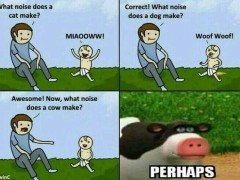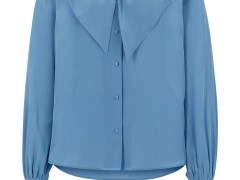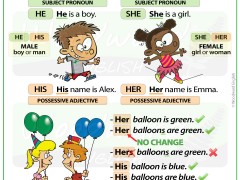whose [huːz] pron. 谁的
blue [bluː] adj. 蓝色的
【搭】blue collar 蓝领
blue moon 罕见的现象
blue joke 低级笑话
* * *
A: Which color do you like best?
B: I like blue more than other colors.
A:你最喜欢什么颜色?
B:我喜欢蓝色多过于其他的颜色。
* * *
perhaps [pəˈhæps] adv. 大概
【扩】approximately 近似地 maybe 大概,可能
* * *
A: I'd like to see the doctor as soon as possible. Because I have a sharp pain in my chest.
B: Let me see... perhaps I could fit you in at 3:00 this afternoon.
A:我希望能尽快看医生,因为我胸口痛得很厉害。
B:让我看看……也许我可以把你排在下午3点。
* * *
white [wait] adj. 白色的
【派】whiten 漂白 whiteboard 白色书写板
【扩】colorless 无色的 snowy 雪白的
【反】black 黑色的
【搭】in white 穿着白衣服
* * *
A: Which do you like better, the white one or the pink one?
B: I like the pink one more.
A:你更喜欢哪个,白色的还是粉色的?
B:我更喜欢粉色的。
* * *
catch [kætʃ] v. 抓住
【扩】snatch 夺
【搭】catch up 赶上 catch a fire 着火
* * *
A: Throw it to me.
B: Can you catch it?
A:把它扔给我。
B:你能接得住吗?
Lesson 12 Whose is this...? This is my/your/his/her... 这……是谁的?这是我的/你的/他的/她的……Whose is that...? That is my/your/his/her... 那……是谁的?那是我的/你的/他的/她的……
father [ˈfɑ:ðə] n. 父亲
【派】fatherly 慈爱的
【扩】dad 爸爸 daddy 爸爸(口语)
* * *
A: How many people are there in your family?
B: Three. My father, my mother and me.
A:你家有几口人?
B:三口人。我爸、我妈和我。
* * *
mother [ˈmʌðə] n. 母亲
【派】motherland 祖国
* * *
A: Give your mother my best wishes!
B: Thanks very much. You are so kind.
A:请向你母亲转达我最良好的祝愿!
B:谢谢,你真是太好了。
* * *
blouse [blauz] n. 女衬衫
sister [ˈsistə] n. 姐,妹
* * *
A: I have an elder brother and two younger sisters.
B: You have such a big family.
A:我有一个哥哥和两个妹妹。
B:你有这么大一个家庭啊。
* * *
tie [tai] n. 领带
【派】bowtie 领结
【扩】necktie 领带
【搭】tie up 绑,系 tie down 向下扎牢
* * *
A: Is there anything I can do for you, sir?
B: Yes, I want to get a few new ties for my collection.
A:先生,有什么能帮您的吗?
B:是的,我想买几条配时装的领带。
* * *
brother [ˈbrʌðə] n. 兄,弟
【派】brother-in-law 小舅子;大伯;小叔;姐夫;妹夫 brotherhood 手足情意
* * *
A: Didn't you know that Peter is Mark's younger brother?
B: No, nobody told me that before.
A:你不知道彼得是马克的弟弟吗?
B:不知道,之前没有人告诉过我。
* * *
his [his] possessive adjective 他的
* * *
A: His performance is wonderful.
B: Yes, his voice is rich and expressive.
A:他的表演太出色了。
B:是啊,他的嗓音丰满且极具表现力。
* * *
her [həː] possessive adjective 她的
pronoun [物主代词]谁的(疑问代词) - Whose side are you on anyway?
adjective [原级]谁的 - He's a man whose opinion I respect.
adjective [原级]蓝色的;忧郁的,沮丧的;<英,非正式> 保守的,守旧的;(笑话、故事等)黄色的,色情的;(由于冷或呼吸困难)发青的,青紫的 - There's no earthly reason for me to feel so blue.
noun [具体名词]天蓝色,蓝色;天空,大海;<英>(剑桥或牛津大学的)校队运动员,蓝色荣誉者;<澳新>红头发者;<澳新>错误,纰漏;<澳新>争论,殴打;近生的牛排 - Can white girls sing the blues?
verb [vt. 及物动词](使)变成蓝色;<史>用蓝色漂白剂洗(白色衣服);<英,非正式>挥霍,乱花(钱财) - There's no earthly reason for me to feel so blue.
adverb [疑问副词]可能;(用以缓和语气或表示礼貌)也许,可能;(委婉地表示不赞同或不接受)也许,大概;(用于提出建议或请求)也许 - You use perhaps in opinions and remarks to make them appear less definite or more polite. (
noun [抽象名词]假定,猜想 - You use perhaps when you are making suggestions or giving advice. Perhaps is also used in formal English to introduce requests. (
adjective [原级]白色的;白种人的,白肤色的;苍白的;(咖啡,茶)加牛奶(或奶油)的;(葡萄酒)白的,淡黄色的;(面粉)精白的,由去皮小麦制成的;<美>空白的;(植物)开白花的,有白色果实的;(树木)树皮淡色的;(玻璃)透明的,无色的;<非正式>完全公正的,非常诚实的;(魔法)善意的;(血细胞)白的;<史>(政治)白色的,反动的;纯洁的 - A white person has a pale skin and belongs to a race of European origin.
noun [专属名词]白色,白颜料;白种人,白人;白葡萄酒;眼白;蛋清,蛋白;白色运动服(whites);(洗涤时要跟深色衣物分开的)白色织物(whites);白衣服;(某些棋盘类游戏中的)执白棋者,白方;白色的东西,(尤指台球中的)白球;白粉蝶 - Whites are white people.
verb [vt. 及物动词]接住;抓住,捉住;扶住(要倒的人);逮住,捕获;(尤指设置陷阱)捕捉;撞见(某人)犯罪(或做错事);(被)钩住,(被)绊住;击中,触到(某人或某物) - Police say they are confident of catching the gunman.
noun [专属名词]接住,截住(某物,尤指球);(鱼的)捕获量,捕获物;<旧>理想的丈夫(或妻子),合适的合作伙伴;搭扣,把手 - He missed the catch and the game was lost.
① vt. 捉住,逮住,捕获
- The police have caught the thief.
- Have you caught any fish today?
② vt. 抓住,握住
- Can you catch the ball?
③ vt. 及时赶到,赶上
- catch a bus 赶车
- I want to catch the eight nineteen (train) to London.
- He ran quickly to catch the last bus home.
- When she caught up with them, she saw that they were going through the contents of the bag.
④ catch 的一些固定用法
- catch a cold 染上感冒
- catch one's breath 摒住呼吸
- catch sight of = see 看见catch fire 着火
- catch one's eyes 吸引某人注意力
noun [专属名词]父亲,爸爸;祖先;发明者,创始人 - He would be a good father to my children.
verb [vt. 及物动词]是…的父亲;创立(新思想),创造,发明(新方法);如父亲般对待(或抚养、照料);确定(某人)的生父为…,确定(某事物)的责任应由…来承担 - She claims Mark fathered her child.
noun [专属名词]母亲;大娘;女修道院院长 - She sat on the edge of her mother's bed.
verb [vt. 及物动词]生下;养育;像母亲般关怀或照管 - Colleen had dreamed of mothering a large family.
adjective [原级]母亲的;出生地的 - Her mother suffered from migraines.
noun [专属名词]女式短上衣,衬衫;宽松上衣 - The blouse clung damply to her skin.
verb [vt. 及物动词]使(衣服)松垂 - She had begun to unbutton her blouse.
noun [专属名词]姐姐,妹妹;(称志同道合者)姐妹;(女权运动中的)姐妹;姊妹,大姐,妹妹(妇女对其他妇女表示友好和支持时的用语);<非正式>姐妹,大姐,妹子(用作女性间的称呼);<美>大姐,小妹(美国黑人妇女之间使用的称呼);修女,女教友(Sister);<英>护士(长)(Sister);(美国大学)女生联谊会会员;(尤指组织之间的)姐妹(关系) - Sister is a title given to a woman who belongs to a religious community.
adjective [原级]同类的,同质的,如同姐妹的 - You can use sister to describe something that is of the same type or is connected in some way to another thing you have mentioned.
verb [vt. 及物动词]系,扎,捆;将…系在…上,系牢;打结;使相联系;束缚;(比赛中)打成平局;用系材(或横杆)连接;用连结线连接(音符);连音演奏(两个音符) - He tied the ends of the plastic bag together.
noun [具体名词]领带,领结;(绑扎东西用的)带子,绳子;纽带,联系;束缚;平局;<英>淘汰赛;<美>枕木,轨枕;延音连接线;系带鞋;系梁 - Jason had taken off his jacket and loosened his tie.
- tie a tie 打领带 how to tie a tie
- wish a wish 许个愿 I wished a wish on the star.
- sigh a sigh 叹口气 sigh a long sigh (长叹一声)
- dream a dream 做一个梦
- die a glorious death 死得光荣
- breathe one's last breath 咽气:指一个人停止呼吸,死亡。
- bow a bow 鞠躬
- 画画、尿尿、数数、盖盖
noun [专属名词]兄弟;同事;战友 - You can describe a man as your brother if he belongs to the same race, religion, country, or profession as you, or if he has similar ideas to you.
interjection [赞美]我的老兄! - Oh , My brother !
pronoun [物主代词]他的 - No one doubted his ability, his industry or his integrity.
pronoun [物主代词]她(she的宾格);她的(she的所有格) - Her is also a possessive determiner.












